13 Best Intercom Integrations for Business in 2026

Every conversation starts somewhere. A live chat ping. A support email. A bot reply at 2 a.m. Intercom is great at catching them all—but what happens after that?
That’s where most teams hit friction.
You’ve got answers in a CRM, call history in another tool, and product alerts buried in a Slack thread. Suddenly, “support” means scrambling for context while a customer waits. Not ideal.
Integrations fix that.
They don’t just connect tools—they dissolve the seams between them. The right Intercom integrations make everything feel like one system, not seven. Agents stop toggling. Data stops vanishing. Teams move faster because nothing gets lost in translation.
And if that sounds abstract, here’s the reality: businesses using integrated workflows report up to 30% lower ops costs and as much as 80% higher productivity¹. It’s not magic—it’s just fewer broken links in the chain.
So we dug in, did our own research. And landed on 13 integrations that actually improve the Intercom experience.
Let’s get into them. Because the real upgrade isn’t more tools. It’s better flows.
Key Takeaways:
- Intercom integrations reduce context-switching by connecting chat, CRM, and voice tools into a single, responsive workspace.
- Tools like CloudTalk, Salesforce, and Zapier help agents reply faster, automate busywork, and personalize conversations with real-time data.
- Smart integrations improve resolution speed and team coordination—without adding headcount or dashboards.
- Not all integrations are created equal. Ease of use, setup time, and data reliability are critical when choosing the right Intercom partner.
- When done right, Intercom integrations disappear into the workflow—freeing agents to focus on what matters: the customer.
No more tab-switching. Just seamless workflows.
What Is Intercom Integration?
Intercom isn’t a one-man band, it’s the conductor. But unless your other tools are playing in sync, the whole thing sounds out of tune. That’s where integrations come in.
Intercom integrations connect your inbox to the rest of your stack—CRMs, call systems, project boards, even spreadsheets—so agents don’t waste time chasing context or duplicating effort.
Here’s what smart Intercom integrations can do:
- Automate workflows by creating tickets, tasks, or updates when a new message comes in
- Sync data like customer records, call logs, and deal status across tools
- Trigger actions across platforms—like tagging a lead, assigning an agent, or logging a call
Take CloudTalk’s Intercom integration as an example. It lets your team:
- Handle calls directly from Intercom
- Automatically log voice data to support or CRM systems
- Access real-time caller context inside the shared inbox
Most Intercom integrations are available via native apps, APIs, or marketplace connectors—and when they’re set up right, they sharpen every conversation.
Want Intercom to talk to your dialer, CRM, and helpdesk?
Best 13 Intercom Integrations to Improve Efficiency in 2025
Intercom is powerful on its own—but it shouldn’t have to work alone.
Magic happens when you connect it to the other tools your team already uses: your CRM, your dialer, your knowledge base, even your product stack.
Below is a curated list of 13 Intercom integrations that stand out in 2025. Each one was chosen for how well it complements Intercom’s core strengths—automating busywork, speeding up response times, and bringing your whole team closer to the customer.
Let’s take a look at what they do—and why they matter.
Intercom integration summary table:
1. CloudTalk
CloudTalk is a modern cloud-based phone system built for teams that rely on voice to support customers and close deals. Its native Intercom integration brings calling and ticketing into the same space—so agents can take action without toggling tabs.
Use Case:
Empower your team to make and receive CloudTalk calls directly from Intercom while automatically syncing call data, notes, and recordings across systems.
Benefits:
- Boost agent productivity with real-time call workflows
- Deliver faster support with full caller context in Intercom
- Eliminate tab-switching between phone and messaging tools
Key Features:
- Real-time call monitoring
- AI-Powered Conversation Intelligence
- Call recording and playback
- Sentiment Analysis
Pricing:
CloudTalk offers flexible plans tailored to business needs. With each of its plans offering more value than its competitors:
- Lite: 19
- Starter: 25
- Essential: 29
- Expert: 49
- Custom: Pricing available upon request
2. Salesforce
Salesforce is one of the most powerful CRM platforms on the market—used by sales and support teams to manage deals, contacts, and account histories. The Intercom Salesforce integration keeps customer conversations and CRM data aligned in real time.
Use Case:
Sync leads, tickets, and account updates between Intercom and Salesforce automatically—so agents always have the full customer picture, without switching tabs.
Benefits:
- Connect sales and support data to deliver smoother handoffs
- Boost agent confidence with real-time context during live chats
- Reduce manual entry with auto-synced CRM and ticket data
Key Features:
- Two-way sync between Salesforce and Intercom conversations
- Real-time alerts for deal changes or new contact activity
- View and update CRM records from within Intercom
Pricing:
Salesforce offers various pricing tiers:
- Sales Cloud Essentials: $25 per user/month
- Sales Cloud Professional: $75 per user/month
- Sales Cloud Enterprise: $150 per user/month
- Sales Cloud Unlimited: $300 per user/month
Salesforce dialer pricing guide
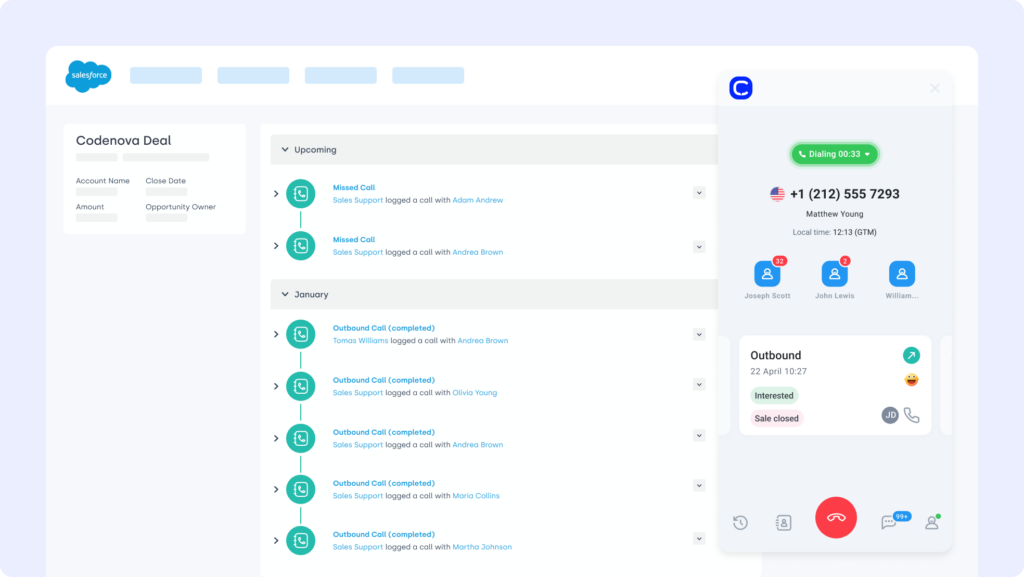
3. Zendesk
Zendesk is a leading customer support platform. The Intercom Zendesk integration bridges messaging and ticketing—giving agents visibility into customer issues across systems without juggling tabs.
Use Case:
Automatically create Zendesk tickets from Intercom chats, track updates in real time, and escalate priority issues without ever leaving the Intercom inbox.
Benefits:
- Sync tickets between Intercom and Zendesk to streamline support
- Improve resolution speed by centralizing conversations
- Ensure no customer query slips through the cracks
Key Features:
- Auto-generate Zendesk tickets from Intercom conversations
- See real-time status updates without leaving Intercom
- Link Zendesk records directly from Intercom threads
Pricing:
Zendesk pricing tiers include:
- Support Team: $19 per agent/month
- Support Professional: $55 per agent/month
- Support Enterprise: $115 per agent/month
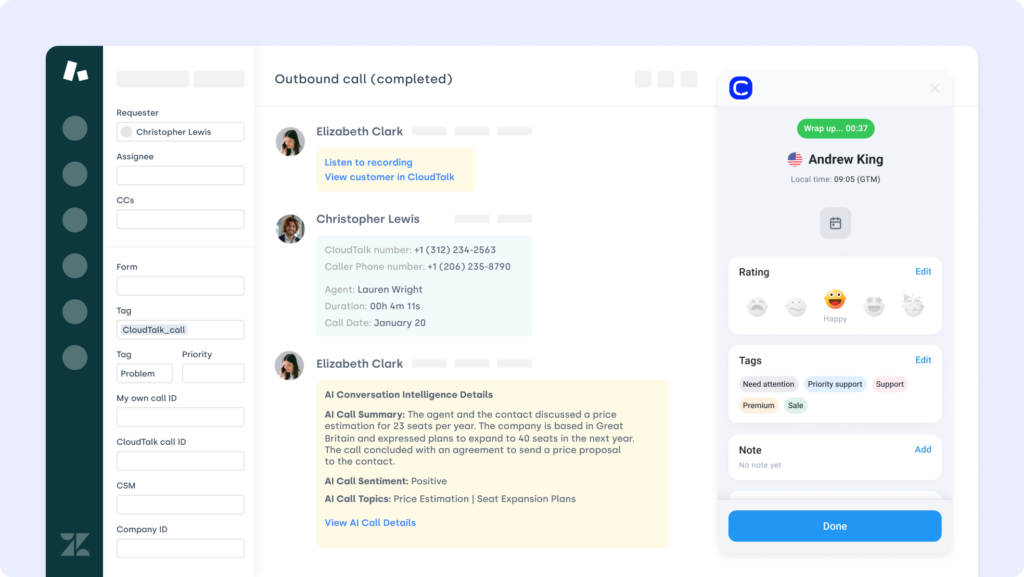
4. Zapier
Zapier is a no-code automation tool that lets you connect Intercom with thousands of apps. The Intercom Zapier integration allows support and sales teams to automate time-consuming workflows across their entire stack.
Use Case:
Use Zaps to trigger automated responses, update CRMs, or log Intercom conversations into other tools like Google Sheets or Slack—without lifting a finger.
Benefits:
- Eliminate manual work with event-based automation
- Reduce human error across connected apps
- Free up your team to focus on real conversations
Key Features:
- Connect Intercom with 5,000+ apps using Zaps
- Auto-update tools like CRMs, spreadsheets, or project boards
- Customize triggers and actions based on Intercom events
Pricing:
Zapier offers various pricing tiers:
- Free: $0/month
- Starter: $19.99/month (billed annually)
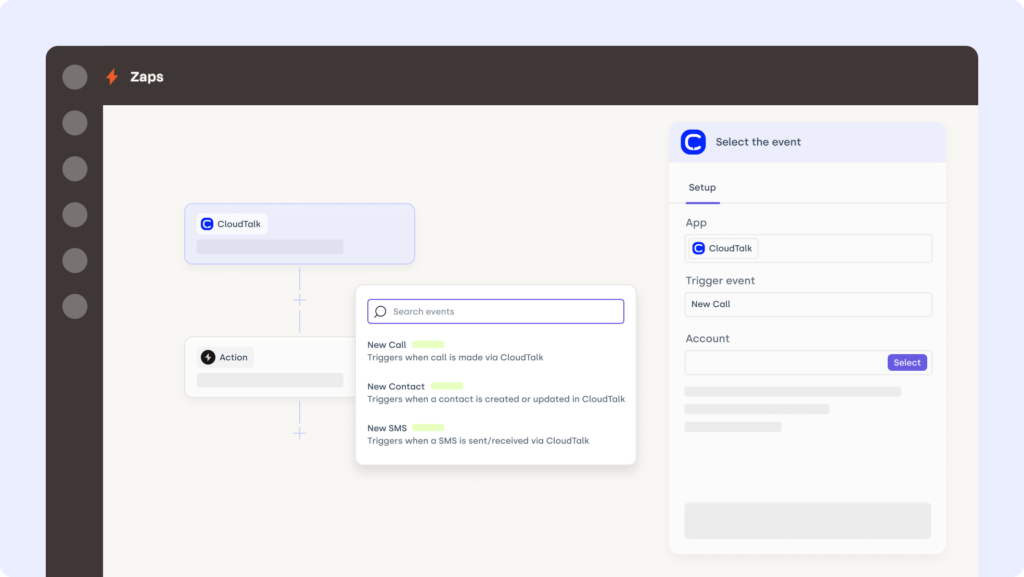
5. Pipedrive
Pipedrive is a sales-focused CRM known for its visual pipeline and automation tools. The Intercom Pipedrive integration brings together deal tracking and real-time customer messaging—perfect for teams that want sales and support in sync.
Use Case:
Automatically log CloudTalk call activity into Pipedrive, while syncing lead updates and follow-up reminders from Intercom to ensure no deal slips through.
Benefits:
- Eliminate CRM busywork with automated call and message logging
- Enable sales and support to share context directly from Intercom
- Move deals faster by triggering Pipedrive workflows from chat
Key Features:
- Log CloudTalk calls and notes into Pipedrive via Intercom
- Sync contacts, deals, and tickets between platforms
- Trigger automations based on Intercom chat actions
Pricing:
Pipedrive offers flexible plans based on team size and needs:
- Essential: $14.90/user/month
- Advanced: $27.90/user/month
- Professional: $49.90/user/month
- Power & Enterprise: Custom pricing
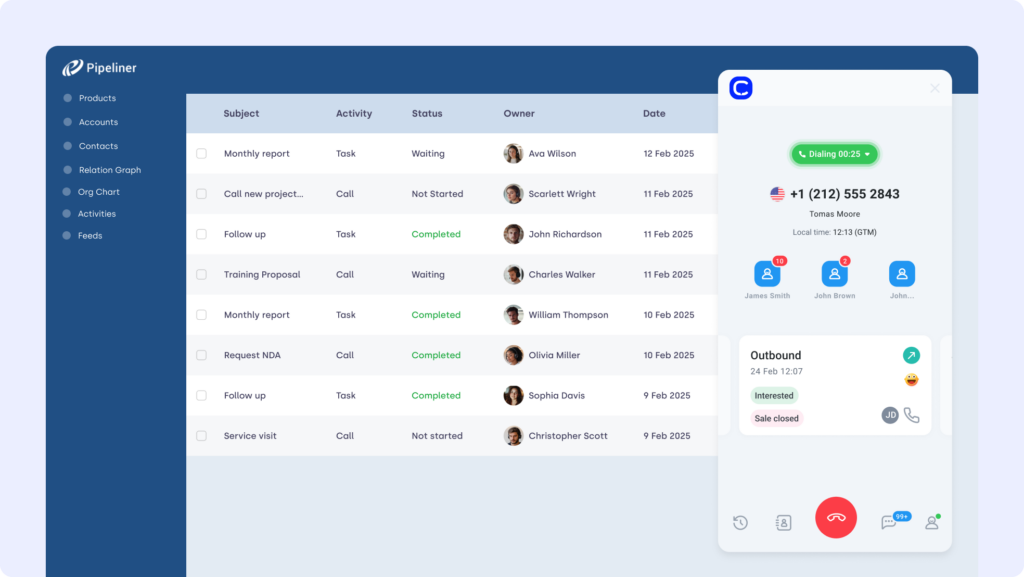
6. HubSpot
HubSpot is a popular all-in-one CRM used for managing leads, deals, and support tickets. The Intercom HubSpot integration brings your sales and service data directly into your inbox—so agents never lose context during a conversation.
Use Case:
Automatically sync contact and deal activity between HubSpot and Intercom, trigger follow-ups from chat, and keep teams aligned across both platforms.
Benefits:
- Connect CRM insights with live customer conversations
- Get real-time alerts on ticket or deal changes inside Intercom
- Reduce manual data entry with automatic two-way sync
Key Features:
- Push chat data into HubSpot contact and ticket records
- Create HubSpot tasks or workflows directly from Intercom
- Keep deal stages and ticket statuses synced in both tools
Pricing:
HubSpot offers a free CRM plan, with paid tiers depending on your team’s size and needs. See HubSpot pricing for details.
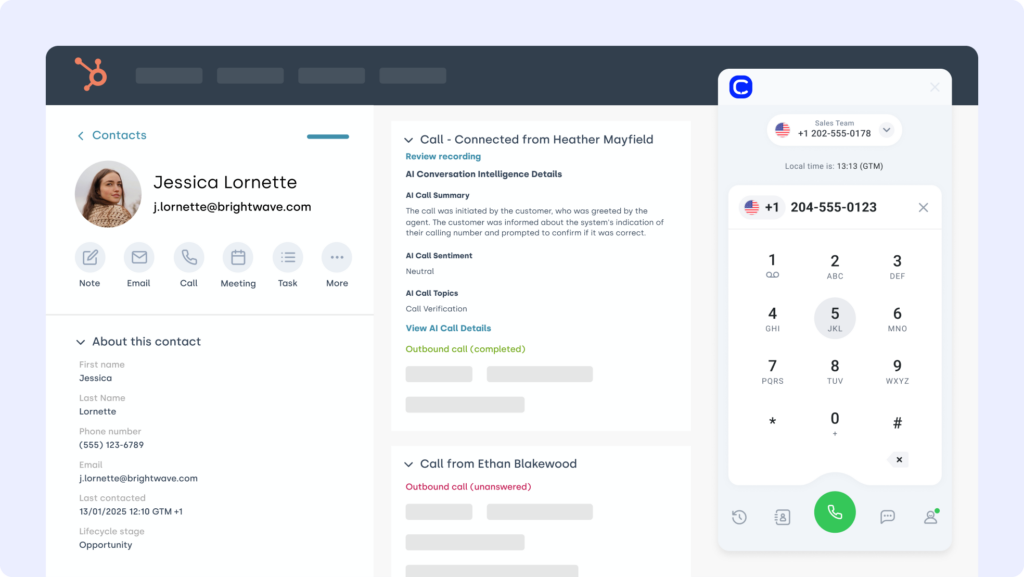
7. Front
Front is a collaborative inbox platform that centralizes email, chat, and SMS into one streamlined interface. The Intercom Front integration brings structured conversations and async channels into harmony—ensuring nothing slips through the cracks.
Use Case:
Surface Front activity—like replies, mentions, or tags—inside Intercom to maintain full visibility on account threads, escalate faster, and support smarter.
Benefits:
- Sync inbox activity with real-time customer conversation
- Gain shared visibility across support and account teams
- Respond faster with context from all communication channels
Key Features:
- View Front messages and internal notes in Intercom
- Trigger alerts based on SLA, tags, or status changes
- Link Intercom chats to Front conversations for better tracking
Pricing:
- Starter: $19/user/month
- Growth: $59/user/month
- Scale: $99/user/month
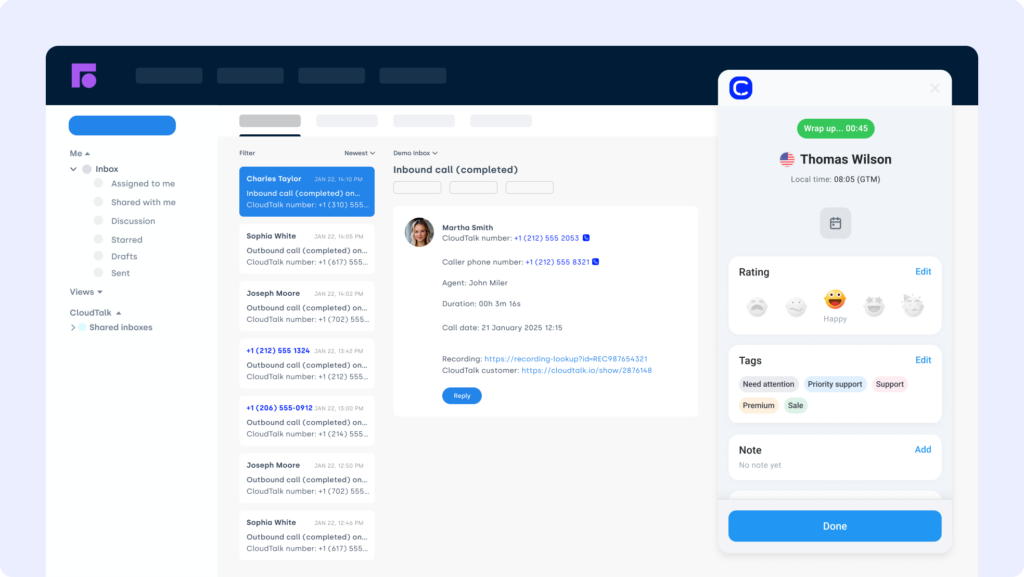
8. Zoho CRM
Zoho CRM is a flexible platform for managing customer relationships across sales, marketing, and service. The Intercom Zoho CRM integration helps unify chat-based interactions with lead and deal data—giving teams the full picture without toggling tools.
Use Case:
Sync Intercom conversations and CloudTalk call data into Zoho CRM automatically, trigger workflows on contact updates, and keep every lead interaction logged in one place.
Benefits:
- Capture call and chat context inside Zoho CRM records
- Align sales and support teams around real-time updates
- Trigger CRM automations from Intercom activity
Key Features:
- Sync CloudTalk and Intercom data to Zoho contacts
- Auto-update lead status based on conversation triggers
- Launch workflows or assign follow-ups from Intercom
Pricing:
Zoho CRM offers tiered plans for teams of all sizes:
- Standard: $14/user/month
- Professional: $23/user/month
- Enterprise: $40/user/month
- Ultimate: $52/user/month
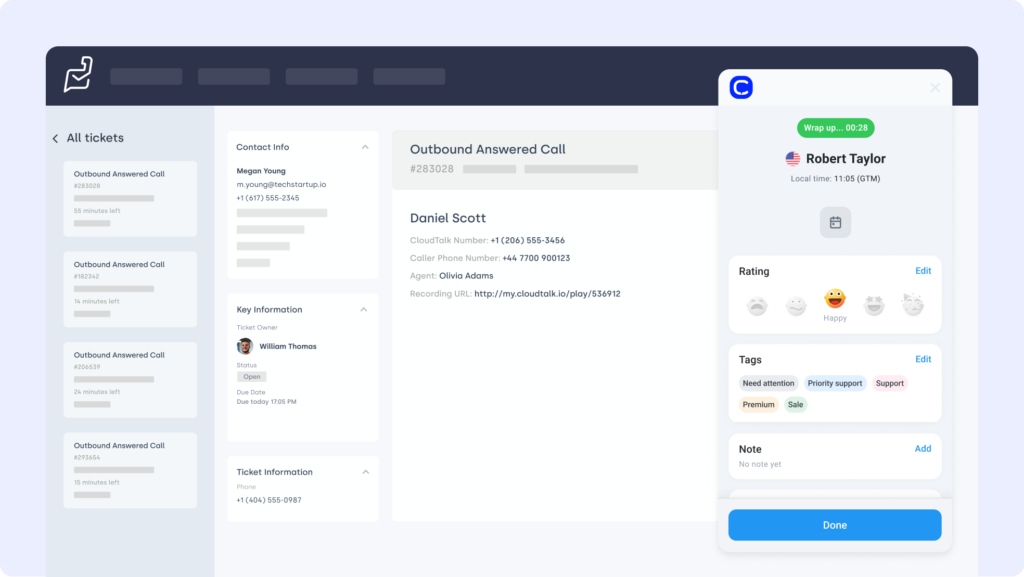
9. Freshdesk
Freshdesk is a popular customer support tool that helps teams manage tickets, automate responses, and collaborate efficiently. The Intercom Freshdesk integration connects live chat and ticket workflows—so your team can handle everything from one ecosystem.
Use Case:
Turn Intercom chats into Freshdesk tickets automatically, log CloudTalk calls with transcripts, and get notified when SLAs are at risk or escalations arise.
Benefits:
- Centralize support tasks across chat, voice, and emai
- Automate ticket creation from Intercom conversations
- Reduce resolution time with synced CloudTalk call logs
Key Features:
- Create Freshdesk tickets directly from Intercom
- Sync CloudTalk call recordings and notes into ticket history
- SLA tracking and ticket alerts sent to your Intercom inbox
Pricing:
Freshdesk offers multiple plans for growing support teams:
- Growth: $15/agent/month
- Pro: $49/agent/month
- Enterprise: $79/agent/month
10. ActiveCampaign
ActiveCampaign is an all-in-one platform for email marketing, automation, and CRM. The Intercom ActiveCampaign integration lets you sync contact data, trigger workflows, and engage leads faster—without bouncing between tools.
Use Case:
Trigger email sequences in ActiveCampaign based on Intercom chat activity, track engagement, and ensure timely follow-ups through synced automation.
Benefits:
- Automate outreach from Intercom chat insights
- Align sales and marketing with shared contact visibility
- Increase engagement by syncing behavior and tags
Key Features:
- Trigger automations based on Intercom actions
- Sync Intercom contacts and custom fields into ActiveCampaign
- Track campaign activity inside contact profiles
Pricing:
- Plus: $49/month
- Professional: $149/month
- Enterprise: Custom pricing

11. LiveAgent
LiveAgent is a multi-channel helpdesk platform that unifies chat, email, and call support. The Intercom LiveAgent integration bridges conversational support with traditional ticketing to keep teams aligned.
Use Case:
Route Intercom conversations into LiveAgent tickets, track resolution updates, and ensure agents are alerted to SLA breaches without switching apps.
Benefits:
- Sync Intercom chats with LiveAgent ticket records
- Improve team responsiveness with live ticket alerts
- Centralize support across messaging and helpdesk
Key Features:
- Convert Intercom messages into LiveAgent tickets
- Get SLA breach alerts and internal replies in Intercom
- Link ticket history and recordings to Intercom threads
Pricing:
LiveAgent offers transparent pricing for support teams:
- Small Business: $9/agent/month
- Medium Business: $29/agent/month
- Large Business: $49/agent/month
- Enterprise: $69/agent/month
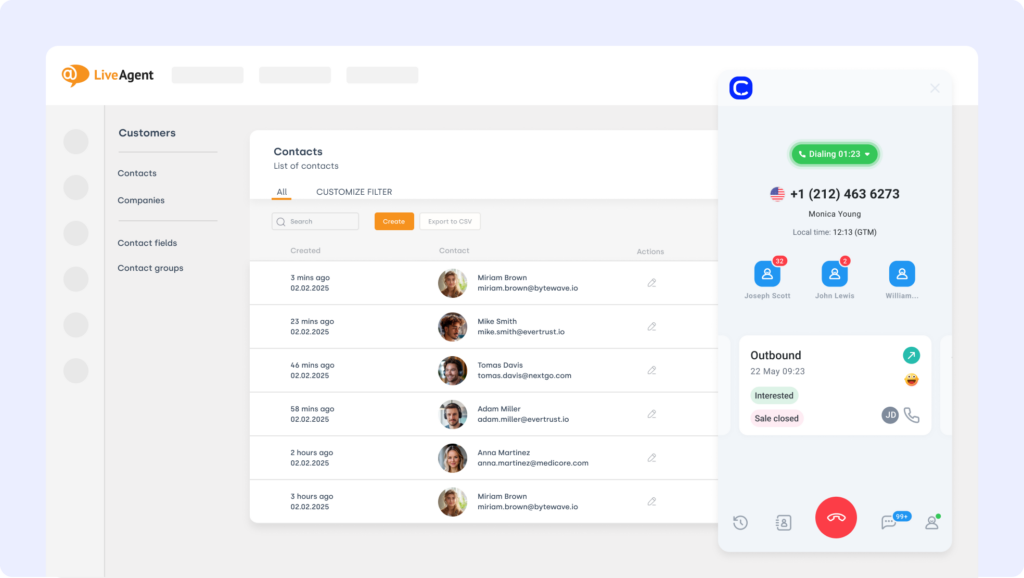
12. Kustomer
Kustomer is a customer service CRM that unifies conversations into a single timeline. The Intercom Kustomer integration bridges messaging and case management for seamless support.
Use Case:
Turn Intercom chats into Kustomer tickets, get real-time updates on priority issues, and keep internal teams in the loop with contextual alerts.
Benefits:
- Escalate Intercom issues directly into Kustomer
- Maintain full conversation history across both tools
- Keep agents informed with timely status updates
Key Features:
- Convert Intercom threads into Kustomer tickets
- Auto-alerts for SLA breaches and unresolved cases
- Smart routing with tags and workflow triggers
Pricing:
- Professional: $89/user/month
- Enterprise: Custom
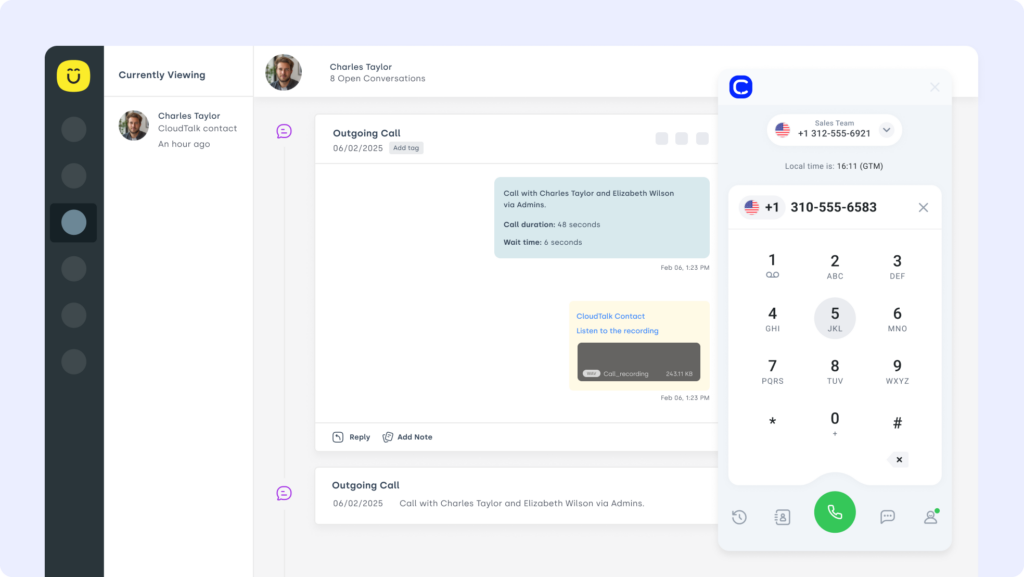
13. Gorgias
Gorgias is a helpdesk platform tailored for ecommerce support. The Intercom Gorgias integration ensures tickets from chat can be tracked, escalated, and resolved collaboratively.
Use Case:
Automatically turn Intercom conversations into Gorgias tickets and notify relevant teams when issues arise, escalations happen, or follow-ups are needed.
Benefits:
- Route Intercom chats to the right agent in Gorgias
- Centralize messaging and ticketing for faster service
- Collaborate on high-impact customer requests in real time
Key Features:
- Intercom-to-Gorgias ticket conversion
- SLA alerts and ticket activity synced to Gorgias
- Internal notes and context passed between tools
Pricing:
- Basic: $10/month + usage
- Pro: $60/month + usage
- Advanced: $900/month
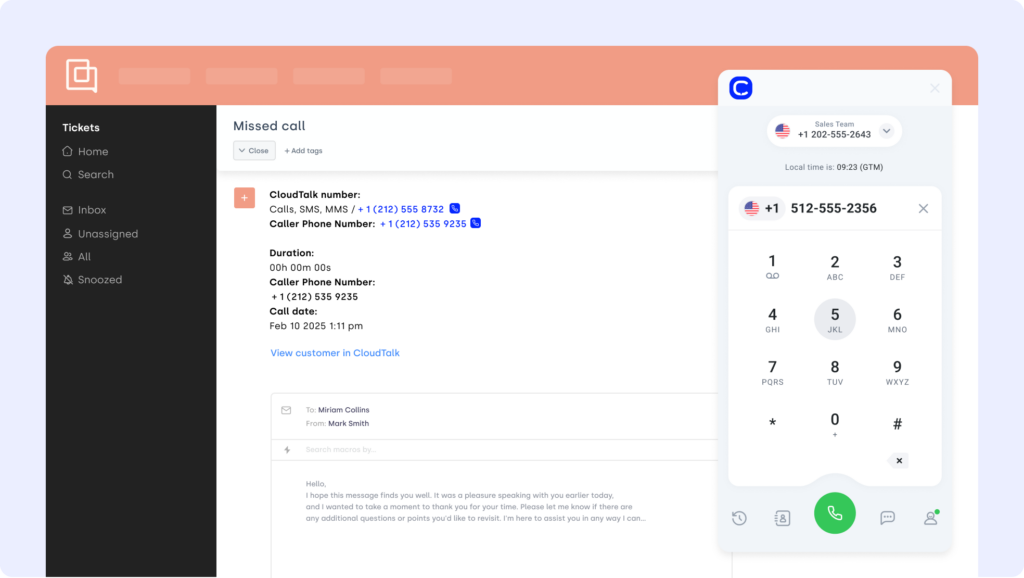
Workflows aren’t broken—they’re just disconnected. Reconnect them.
How to Choose the Best Intercom Integration
Tailored for real-world Intercom users.
1. Map Your Support Workflow First
Don’t start with software—start with problems. Are you losing time chasing email threads? Missing key updates across tools? A great integration solves actual pains. For instance, CloudTalk’s Intercom integration automatically logs calls and updates records mid-conversation—so your agents stay focused, not buried in tabs.
2. Prioritize Setup Speed and Compatibility
If an integration takes a dev team and three weeks to install, it’s not a solution—it’s a side project. Look for tools with native Intercom apps, one-click setup, and no-code options. CloudTalk’s dialer setup takes minutes—not days.
3. Think About Long-Term Fit
Some integrations break the moment your team grows. Will it still work when you add new teammates or tools? Can it scale with your support volume? CloudTalk’s smart automation scales across teams—from five agents to full-service call centers.
4. Ensure Secure, Compliant Connections
Every integration adds a new door to your data. Make sure it locks. Choose providers that follow best practices like SSO, role-based permissions, and audit logs. CloudTalk’s VoIP integration keeps customer data secure without slowing your team down.
5. Choose Integrations Backed by Real Support
Every integration works great during the demo. The real test comes during outages or sync failures. Can you reach a real human fast? Are SLAs, logs, and uptime tracked transparently? CloudTalk’s support jumps in when you need them most—no AI hold music, no three-day silence.
Connect the Gaps. Deliver the Experience.
Support doesn’t break because your team can’t type fast enough—it breaks when the signals are scattered. A missed handoff. A call logged in the wrong tool. A reply sent without full context.
Integrations are what align the noise. They turn scattered inputs into one continuous thread—so Intercom doesn’t just handle the message, it carries the moment.
The best part? You don’t need to build it from scratch.
Pair Intercom with CloudTalk and the right stack to automate follow-ups, unify tickets and call logs, and make real-time collaboration actually… real-time.
Setup shouldn’t be a separate project. We can help you!
Sources:
















